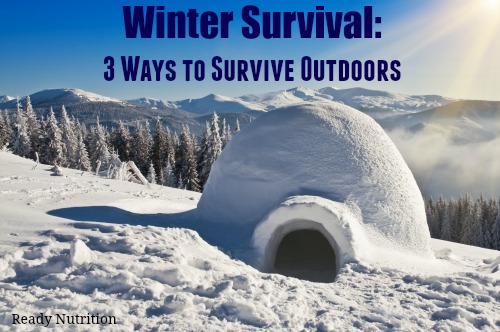
Your Top Priorities In a Cold Environment
Your primary concerns in such an unforgiving environment is shelter and water. You want to ensure you can maintain your body heat. One small mistake such as accidently losing a glove or eye protection can cause detrimental issues like hypothermia, frostbite and even snow blindness. In addition, the clothing layers you wear outdoors could make all the difference in the world. Proper layers insulate and prevent heat loss, and in an emergency situation, you may need to improvise and find what is around you to maintain a proper body temperature. For example, dry leaves could be used as an emergency layer of insulation if you are concerned with hypothermia.
A trick that many outdoor enthusiasts use to warming their outdoor emergency shelters, is having a thermal barrier to trap heat in the shelter. An example of this type of barrier is Mylar blankets. If you position your Mylar sheeting to reflect the heat of your fire toward your tent, you can increase the heat substantially. Mylar blankets is one item that can make all the difference in the world! This lightweight prepper item is one of the most multipurpose items you can take with you and a must-have for your outdoor gear! Ever wonder about all the ways you can use Mylar? Check this article out.
Water is another top priority. Dehydration is a major risk when outdoors. Cold weather studies at the University of New Hampshire show increased risk for dehydration, a condition many associate with hot weather emergencies. “People just don’t feel as thirsty when the weather is cold,” says Robert Kenefick, UNH associate professor of kinesiology. “When they don’t feel thirsty, they don’t drink as much, and this can cause dehydration.” Moreover, excessive perspiration, heavy clothing and increased respiratory fluid loss are other factors that contribute to dehydration in cold climates. For example, when you can see your own breath, that’s actually water vapor that your body is losing. The colder the temperature and the more intense the exercise, the more vapor you lose when you breathe.
As well, you want to put careful thought into the tools you carry with you. Not only should the tools be helpful, but some should serve a double purpose of preventing hypothermia. Some other tools to consider are:
Tools:
- Ax
- Survival knife with 4-6 inch blade
- Thick waterproof tarp
- Extra long Mylar blanket
- Waterproof winter gloves
- Shovel
- Paracord
Keep These Shelter Tips in Mind
- If you can face your shelter towards the east you will be able to prevent heat loss from prevailing winds and storms coming into your shelter.
- Protect yourself from the elements by using branches, sticks, tarps or whatever you have available. Pine branches are great for wind-proofing your shelter and preventing heat loss from the ground.
- Body heat can quickly escape if you do not have a ground insulator. If you can make your bedding area off the ground, you will be able to conserve more body heat. Consider pine needles, leaves, spruce boughs and/or branches, or even building up the snow around your primitive shelter.
- Take into consideration your energy output on building the shelter versus the protection of the shelter.

They always conveniently forget to include a “firearm and ammunition” in their list of equipment. That/those should be at the top or right next to fire making tools, near the top. A decent gun can be used for several things..signalling, self-defense, hunting and the powder from a couple of bullets can be used to help start a fire.
Actually, if you feel that a “firearm and ammunition” is a really high priority item to have in a survival situation, then you are totally unprepared to start with. Yes, I do believe a firearm and ammunition could be useful, but not necessary equipment, and in cold weather, the extra weight of carrying it could be very detrimental. Besides, have you ever tried using a firearm in dangerously cold weather? It’s nearly impossible without freezing.